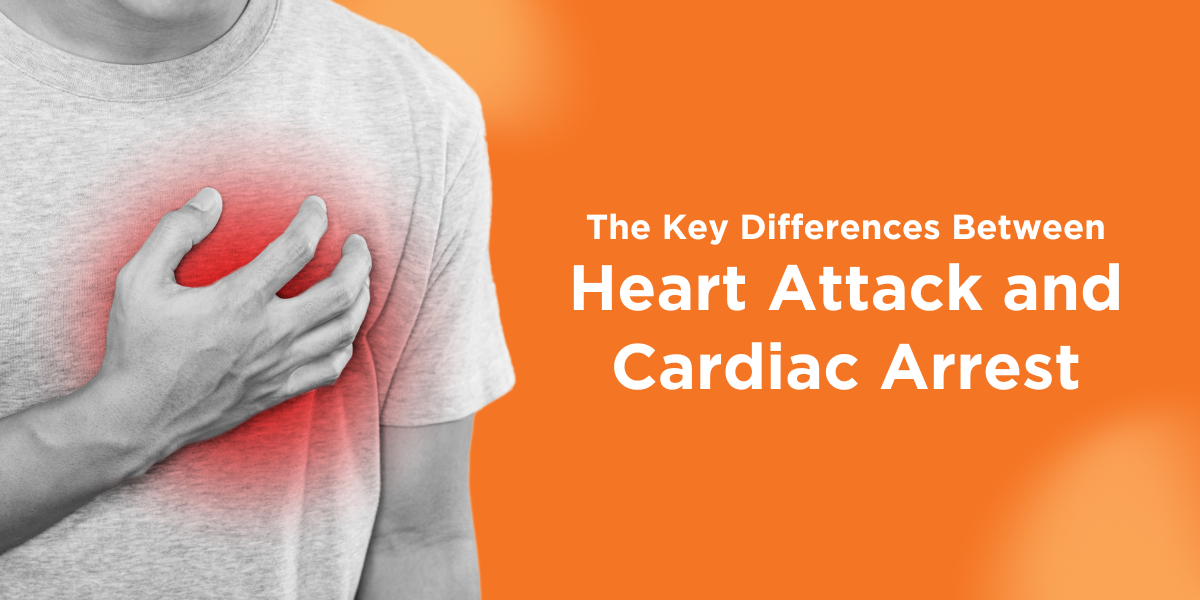
The Key Difference Between Heart Attack and Cardiac Arrest
Heart disease is a top cause of death worldwide. According to the Heart Foundation, there are 430,000 Australians may experience a heart attack. Majority of being affected are men than women, and the incidence of heart attacks increased by 6% since 2017-18. Also, according to the Heart Registry, there are an estimated 22,000 to 33,000 cardiac arrests occurring annually.
With this data, we’ll explain more about heart disease and how you can treat them.
What are the differences between these heart diseases?
Knowing the differences between different heart conditions is crucial for making informed choices about your health. Understanding your heart condition helps create personalised treatment plans and ensures quick responses during emergencies. Individuals can take proactive steps towards effective treatment and timely action by being aware.
Heart Attack
A heart attack, medically known as a Myocardial Infarction (MI), happens when blood flows to part of the heart and gets blocked. This blockage prevents oxygen from reaching the heart muscle, potentially damaging circulation due to blocked blood flow.
Causes
- Heart attacks can be triggered by several factors: smoking, which damages the arteries; high blood pressure, which puts stress on the arteries; and high cholesterol, which leads to plaque buildup in the arteries.
Symptoms
- Heart attack symptoms include chest pain or discomfort, often described as pressure or squeezing in the centre of the chest that lasts for more than a few minutes or comes and goes.
Immediate Response
- If you suspect someone is having a heart attack, call emergency services right away.
Treatment
- Treatment for a heart attack often includes medication to dissolve blood clots and ease pain, along with procedures like using a balloon to open blocked arteries or inserting a mesh tube to keep them open. Surgery may be needed in severe cases to improve the heart’s condition.
Sudden Cardiac Arrest (SCA)
Definition
- Cardiac Arrest is when the heart suddenly stops beating because of an electrical problem. This stops blood flow to the brain and organs, causing unconsciousness.
Causes
- A sudden electrical issue in the heart can cause an irregular heart rhythm called ventricular fibrillation.
Symptoms
- When someone experiences sudden cardiac arrest, they collapse, lose consciousness, and have no pulse or irregular breathing.
Immediate Response
- If someone collapses and doesn’t respond, call for help right away, begin CPR to keep blood flowing, and use an AED if available.
Treatment
- After saving someone’s life, doctors use medicine and cooling therapy to protect their organs. In some cases, it might need a special device called an Implantable Cardioverter-Defibrillator (ICD), which is a device that will keep the heart strong in the future.
As the old saying goes, “prevention is better than cure.” If you find yourself with this condition, it’s important to change your lifestyle so that the heart condition will be improved.
Lifestyle Changes to Prevent Heart Disease
Taking steps to prevent heart disease is crucial for maintaining overall health. Here are some practical strategies to lower the risk of heart attacks and cardiac arrests:
Heart Attack
Keeping your heart healthy means eating well with lots of fruits, veggies, whole grains, and lean proteins, and staying active. Regular check-ups with your doctor help monitor blood pressure, cholesterol, and overall heart health, catching any issues early. Manage risk factors like high blood pressure, high cholesterol, and diabetes with medication, lifestyle changes, and sticking to your treatment plan.
Cardiac Arrest
For high-risk individuals, such as those with specific heart conditions, consider using implantable cardioverter-defibrillators (ICDs) to regulate heart rhythms and reduce the risk of sudden cardiac arrest. Monitoring your heart health closely and making lifestyle adjustments can significantly lower the chances of serious heart problems.
By incorporating these lifestyle changes and preventive measures into your daily life, you can protect your heart and lower the risk of heart disease.
Love your heart
Recognising signs early and acting quickly can make a big difference in your heart health journey. Don’t forget to schedule regular check-ups and make minor changes like eating well and staying active. By taking care of your heart, you’re setting yourself up for a longer, healthier life.
We recommend familiarising yourself with Heart of the Nation’s Chain of Survival during times of crisis. Take the time to learn more about them.
Stay in the loop with all things by following us on Sunrise Local Stores Facebook Page and Instagram for updates.







